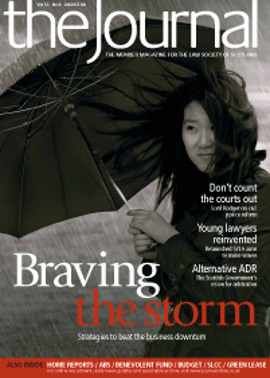Young lawyers reborn

“Come to our relaunch party”, the young lawyers chorused. Recognising the call of duty to show face for the Journal (and not being averse to a modest celebration), I set course through the pouring rain of an early June evening for a convivial basement bar in Glasgow’s Merchant City. Visions of rubbing shoulders with the cream of today’s rising stars were slightly jolted when, as one of the first to arrive, I was followed in by ex-Law Society of Scotland President David Preston, and retiring (in one sense at least) BBC Scotland solicitor Alistair Bonnington. Yes, they have a generous definition of young lawyer these days – must be age discrimination law at work.
As the party began to swing, its purpose became clearer. The SYLA wanted to make it a reunion-cum-thank you to those who had helped it on its way in the past, as well as raise its profile among those who might do so in the next few years. And indeed the turnout suggested that both boxes were satisfactorily ticked.
David Preston, a member of the first committee, reminisced on the early days, including the meeting to approve the first constitution. (“And somebody did get up and say, Mr Chairman, there should be a comma in clause 2, subparagraph (3)(b)…”) Fortunately the fledgling Association found itself more significant things to do, and the number of past office bearers who have gone on to achieve prominence in the profession testifies to the place it has secured for itself.
Ambitious strategy
“There is no other organisation that can speak for young lawyers”, current President Maryam Labaki pointed out when we met for a chat a couple of weeks later. “All the committees have achieved a lot, for example with the campaign over trainee salaries”.
She admits that the Association’s fortunes have fluctuated over the years. Committee membership demands a time commitment from people who are mostly junior lawyers at the mercy of demanding bosses and targets. Since becoming President she has made a point of keeping meetings short!
You have the impression however that Labaki is one who is liable to make things happen. The relaunch was clearly part of a strategy. “Our ambition is to increase our contact with our members and potential members, including via a newsletter. We’ve doubled our membership this year to between 500 and 600. We’ve raised our profile through trying to go out to meet people. We said ‘Go west’ and have done more in Glasgow. And we hope to hold an event in Aberdeen in September, a social evening/meet the committee thing for people to get to know us. Maybe we’ll have more in the way of local groups and events. We’ve kind of gone back to our basics, thinking about what different types of lawyers do and trying to be more approachable. And I decided that we shouldn’t have a membership fee – at least while I’m President!”
Triple focus
From the outset SYLA has had three main objects. Education features quite heavily, through CPD-qualifying courses which may cover subjects such as choosing a career in-house, or becoming dual qualified, as well as practice areas. “We try to run these cost effectively; we often have high profile speakers who give freely of their time. We couldn’t do this without their support. We aim to make the events as cheap as possible, to encourage firms to send their trainees and NQs. And we often manage to get sponsorship, which keeps the costs down.”
That side of things also includes keeping members informed on the big issues of the day, perhaps organising debates as a means of gathering views to submit to the Society. During the alternative business structures consultation they held an event in Edinburgh with a video link to Glasgow – “we didn’t get a huge number coming but it was important to do it, and we had people from Crown Office and RBS to give their points of view about how forms of ABS operate already”.
Representation has a further aspect – if a member, or indeed a non-member, wants to be represented anonymously before the Society, SYLA can do that for them, or help with information on Diploma and traineeship places. And there may be issues common to many members: “Whatever area they practise in, everyone is becoming quite worried about job security”, Labaki comments. “Then there are the problems with criminal legal assistance and civil legal aid – we get emails from trainees and NQs asking should they jump ship? They feel they are in a precarious position. Similarly with the education and training reforms – who knows what the result will be? We can’t advise them, but we can suggest who they should speak to and also how to put in representations of their own. And it gives us the opportunity to respond to consultations.
“The way the market is, people are worried generally. We represent them and we must know what their worries are.”
The Association was even granted a meeting with Justice Secretary Kenny MacAskill on the legal aid proposals. “We delivered our submission and were able to ask him for his thoughts”, says Labaki, herself one of the rare breed of young lawyers still practising in criminal defence work.
But back to where we came in. The most popular events, now as ever, are the social, which range, in season, from barbecues to Burns Suppers to balls – and recently a five-a-side football tournament, even if that one failed to cross the gender divide.
“There’s always a great turnout for social events”, Labaki adds. “People are working increasingly long hours, so we tend not to run these during the week. There are very tight constraints on young lawyers starting out, and people are trying to prove themselves. That’s why it’s important to have nice things to go to.”
Still independent
One thing to be kept in balance is its relationship with the Law Society of Scotland. The Society has paid increasing attention to the junior end of the profession in recent years, through two co-opted members of Council, the appointment of Collette Paterson as New Lawyers’ Co-ordinator, and, currently, a trial period under which the Society helps SYLA with administrative support (“which saves us sitting up at night stuffing envelopes”) – in addition to joint projects such as a student diary carrying much advice on embarking on a career in the law.
Labaki insists that these developments can only be taken so far. “We don’t want to compromise ourselves or the Society”, she states. “We couldn’t do what we do and not be independent.” So her Association will continue to act as a ginger group in relation to the professional body while at the same time receiving assistance from it – on the basis that both are working for the best interests of the profession.
And for Labaki and her committee, all the unpaid hours may bring benefits in the long run. “I’ve met some fantastic people; people have been very kind. You get exposed to different aspects of the law, you develop a network and develop your presentation skills in different environments. It’s important for your career – it’s becoming the norm.”
Oh, and is the name going to change? “SYLA is open to everyone from student up to 10 years qualified, of whatever age. But its events are open to all ages and stages, and members and non-members alike.” Perhaps inclusive enough that everyone who wants to count themselves as young, is able to do so.
In this issue
- Where have we come from, where to next?
- Shifting sands
- A rank bad rule
- Braving the storm
- Civil justice: where next?
- Title Conditions Act: new registration procedures
- Young lawyers reborn
- Shining some more light...
- Power to the tribunal?
- Piece by piece
- The poor in our midst
- The Society's future role in complaints handling
- Appreciation: Lord Johnston
- Professional Practice Committee
- Facing the lean years
- It's a web 2.0 world
- Questions, questions
- Bare necessities
- Coming on the blind side
- Relocation, relocation
- Worse than the disease?
- Sleeping bounty
- Scottish Solicitors' Discipline Tribunal
- Website reviews
- Book reviews
- Industry standard
- Meet the committee
- What's in a motto?
- Leasing by example
- Good call?
- Home reports - the practice questions






